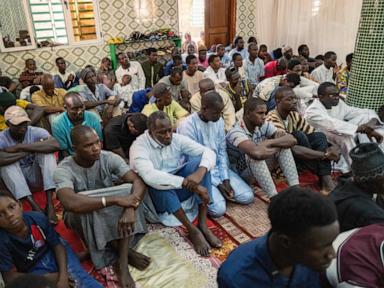World
Senegal’s ‘Schools for Husbands’ Transform Gender Roles in Families

In Dakar, Senegal, an initiative is reshaping traditional gender roles and improving maternal health through education. Known as “schools for husbands,” this program encourages men to take a more active role in household responsibilities and health decisions affecting their families. Led by community leaders like Ibrahima Diane, the initiative aims to promote “positive masculinity” and enhance awareness around critical social issues.
Empowering Men to Support Families
During a recent session, Diane addressed a group of 14 men, emphasizing the importance of their involvement in domestic duties. “The Prophet himself says a man who does not help support his wife and children is not a good Muslim,” he asserted. Reactions from the audience varied, with some laughing while others applauded, reflecting the gradual shift in attitudes.
Since its inception in 2011, the program has garnered support from the Ministry of Women, Family, Gender and Child Protection. Aida Diouf, a health worker collaborating with the initiative, highlighted the necessity of male involvement in maternal health discussions. “Without men’s involvement, attitudes around maternal health won’t change,” she stated, noting that many husbands prefer their wives not be treated by male health workers.
The “schools for husbands” have expanded to over 20 locations, training more than 300 men in Senegal. The program follows successful models from countries like Niger, Togo, and Burkina Faso, where increased male participation has led to improved access to reproductive health services.
Changing Perspectives on Maternal Health
Men who complete the program become peer educators, visiting homes and conducting informal discussions on gender equality and women’s rights. Former army commando Habib Diallo shared his personal experience: “When my son’s wife was pregnant, I encouraged him to take her to the hospital for the delivery.” Initially hesitant due to concerns about cost and trust in the healthcare system, his son ultimately recognized the benefits of hospital delivery.
Despite a decline in maternal and infant mortality rates in Senegal over the last decade, the country still recorded 237 maternal deaths per 100,000 live births in 2023, with 21 newborns dying out of every 1,000 within their first month. The global target set by the United Nations aims to reduce maternal deaths to 70 per 100,000 live births and newborn deaths to under 12 per 1,000 by 2030.
Education around maternal health is crucial in a country where many women still give birth at home. El Hadj Malick, a program coordinator, noted that “by educating men about the importance of supporting their wives during pregnancy, taking them to the hospital, and helping with domestic work at home, you’re protecting people’s health.”
While the initiative has seen positive outcomes, Malick acknowledged the challenges in changing entrenched mindsets. Some men perceive discussions about gender equality as foreign or abstract, fearing it may promote LGBTQ+ issues, which remain taboo in much of West Africa. “When we focus on women’s right to be healthy, it puts a human face on the concept, and it becomes universal,” he explained.
This innovative approach to gender roles in Senegal highlights the critical role men can play in supporting maternal health and promoting gender equality. As the program continues to grow, it offers hope for a healthier future for mothers and children across the nation.
-

 Lifestyle3 months ago
Lifestyle3 months agoLibraries Challenge Rising E-Book Costs Amid Growing Demand
-

 Sports3 months ago
Sports3 months agoTyreek Hill Responds to Tua Tagovailoa’s Comments on Team Dynamics
-

 Sports3 months ago
Sports3 months agoLiverpool Secures Agreement to Sign Young Striker Will Wright
-

 Lifestyle3 months ago
Lifestyle3 months agoSave Your Split Tomatoes: Expert Tips for Gardeners
-

 Lifestyle3 months ago
Lifestyle3 months agoPrincess Beatrice’s Daughter Athena Joins Siblings at London Parade
-

 World3 months ago
World3 months agoWinter Storms Lash New South Wales with Snow, Flood Risks
-

 Science3 months ago
Science3 months agoTrump Administration Moves to Repeal Key Climate Regulation
-

 Science2 months ago
Science2 months agoSan Francisco Hosts Unique Contest to Identify “Performative Males”
-

 Business3 months ago
Business3 months agoSoFi Technologies Shares Slip 2% Following Insider Stock Sale
-

 Science3 months ago
Science3 months agoNew Tool Reveals Link Between Horse Coat Condition and Parasites
-

 Sports3 months ago
Sports3 months agoElon Musk Sculpture Travels From Utah to Yosemite National Park
-

 Science3 months ago
Science3 months agoNew Study Confirms Humans Transported Stonehenge Bluestones









